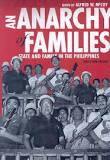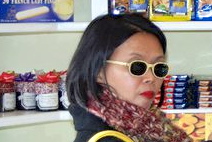
Paltik Presidente
It is fascinating to check out the genealogy of Rodrigo Duterte. He excuses his foul mouth by such comments as “hindi ako anak ng konyo”—I am not a child of the upper classes.
But if you look up his bio, his father, Vicente G. Duterte, was in fact the governor of his province, Davao, when he was growing up, in 1959 to 1965—his formative, teenage years. Thus, he was no unknown peasant when he was learning to be a man. He grew up a governor’s child. He is, in fact, “anak ng konyo”—that is, a child of privilege.
There is no sense that his father had oligarch ways; in fact, there is very little info on what his father had done for Davao.
But Davaoeños on my FB page mention that his mother, Soledad Roa-Duterte, was known for her good heart, a civic leader—she supported Cory Aquino in 1986. It is said Cory Aquino handpicked Duterte to be officer-in-charge of Davao City when his mother declined the honor. He was elected mayor in 1988 and served six terms, a mayor of Davao City well into the 2000s.
That the origin story of Duterte, champion of death squads as a form of justice, lies in his being handpicked by Cory Aquino says a lot.
The Philippines’ continuing accommodation of Marcos-style fascist warlords, from the Cory years on, is the country’s rot. State violence remains our cancer though the dictator has, so they say, died.
Duterte likes to talk about Davao as a safe city under his long mayoralty; Human Rights Watch notes otherwise. Davao City certainly was not safe when a rash of hostage taking occurred in 1989, a now infamous year after his well-publicized account of the rape and death in 1989 of Australian missionary, Jacqueline Hamill. Davao, then and now, is probably no more safe than any large city in the Philippines with guns and assassins and petty thieves and drug lords operating in militarized local settings—in which too often state oppression joins with personal revenge—that have marked the Philippines since the guardia civil killed Crispin in the Noli, and the Americans took up where the Spaniards left off, and then our own series of sad republics has had its day.
Instead, what is remarkable about Duterte’s Davao City is not its dubious safety but its death squads. Duterte’s fans like to say that the extrajudicial killings of street children and drug addicts are worth it if the rest of citizens can walk the streets free. But no citizen in her right mind should sleep well at that cost. As far back as 525 B.C, the ancient Greeks knew well enough that Orestes and the rest of his bloodletting ilk of the house of Atreus had to stop taking justice in their own hands already. Thus courts were invented (so says Aeschylus). Courts, as far the civilized world goes, remain a fine alternative to bloodletting.
State-supported violence to tamp down crime is not security: it is crime. But when one looks further into Duterte’s genealogy, one gets an insight into his assassin-friendly rule. The Dutertes, like many Davaoeños, are emigrants from elsewhere, usually Cebu. In Duterte’s case, his father Vicente was from Danao City, in Cebu province. That lone consonant shift, v to n, Davao to Danao, is a significant différance. Danao City is the stronghold of the Duranos, a warlord family to which the historian Michael Cullinane devotes a whole chapter in Alfred McCoy’s classic anthology on Filipino cronyism, An Anarchy of Families. The figurehead of the violent, gun-loving Duranos is their patriarch, Ramon Durano, Sr. His wife was Beatriz Duterte.
There’s the rub.
Turns out the Dutertes of Danao are linked to the notorious Duranos, potent deliverers of Cebu votes to the Marcos dictatorship in every crucial election of Marcos’s reign.
This is what I gather from the family trees that have proliferated since the man has become a buzzword—not all of his words so nice—in these elections (correct me if I am wrong, as the genealogies are actually conflicting): Beatriz Duterte Durano is the first cousin of Vicente G. Duterte, the late governor of Davao. Beatriz and Vicente’s fathers, Facundo (Vicente’s) and Severo (Beatriz’s), are brothers, children of Isabelo Duterte and Concepcion Buot. Since 1955 to 1986, Beatriz Duterte Durano was a force in Cebu politics, trading off the position of Danao mayor or congressperson with her children, Boy and other boy Duranos, so that their elections were “monotonous,” says Cullinane.
But her husband, Ramon Durano, Sr., is the kingpin—the Marcos crony whose spectacular devotion to martial rule is not meteoric but metonymic: his name is a substitute for the GGG (not galunggong, but guns, goons, and gold) of Philippine politics.
When I was growing up, visiting Cebu every summer, I’d hear of these toxic Duranos. Their fiefdom, Danao, was the well-known, dreaded (to a child’s mind) place of paltik. Some towns are known for their puto or their piña; Danao was known for its paltik—crude but effective Filipino-made guns, made illegally, but the Marcos-era police turned a blind eye. I grew up thinking that if you entered Danao, you’d be riddled with drug addiction or bullets. The Duranos were the overlords and masterminds of an un-charming cottage industry. At a time when violence was normalized and rumors of disappearances were as common as the whiff of kaingin, to me violence in Cebu equaled the Duranos. Guimaras was famous for its mangoes; Danao for its deaths. These were childhood equations of my martial law years.
If I mention the Duranos to my sister, for example, she immediately says—so violent. If I mention Duranos among Manileños, I only get glassy eyes. The power of the family is unknown. Information about the provinces is so lacking in the capital that it is no surprise that to many, the Duterte phenomenon catches them unaware. This is one more strike against the blinkers of the people of the national capital region. Significantly, in the last Pulse Asia Survey, the only region in which Poe and Roxas win is the Visayas. Who knows if that is because—they are aware of Duterte’s entire career—or of course Poe and Roxas have their own familial footholds in the Visayas—or maybe the Visayans are more intelligent and knowledgeable than the people in Manila would care to admit, knowing both the capital region’s personalities as well as their own. Who knows.
News reports state the Duranos of Cebu City (don’t know about Danao City) are not (publicly) on Duterte’s side in this election (the family had huge splits after Marcos years, according to Cullinane); but that does not negate the Durano/Marcosian style of Duterte’s views of law and order, ie, extrajudicial killings as state policy. He’s interesting (and thus maybe worse) in that he’s pretty open about it.
I keep wondering why the biography and genealogy of Duterte barely make play in Manila news. I imagine it is because for so long the man was ignored in the capital, for his Bisaya accent, his outrageous mouth, and his provincial affect as some no-name bumpkin. It would have been useful to figure out that the man has long had pertinent examples from his own set of relatives, however distanced or estranged he may be (I have no information on his actual personal relations with them) as an example of how to remain in power.

Ms. Apostol, my family is from Danao City and I grew up in the era you mention in your essay. I agree with most of what you write about the Duranos and Cebu politics as a whole.
The patriarch of the clan, Ramon “Manong Amon” M. Durano Sr. was indeed a shrewd and ruthless politician. He could rightfully claim into turning Danao into a city (albeit still third class after all these decades) but he did not exactly not financially and politically gain from it.
He is notoriously known for underpaying thousands of his factory (sugar mill, cement factory, ice plant, telephone company, etc.) workers, justifying it with the skewed logic that if these employees had worked in Mandaue or Cebu City, they’d have to spend for transportation fare and meals plus hours on the road traveling. Not sure how many took his explanation as gospel truth but collected their measly salaries just the same. Even longtime company executives were not spared this wage underpayment and Durano’s logic.
As to land grabbing and murders on his order. Those are the stuff of legend. Not that they are untrue, but that those stories still circulate to this day with eyewitnesses and victims still alive to tell their tales. The liquidation of political opponents has left scars. My family has a traumatic experience that goes back to World War II, when a still unwealthy but already crafty Manong Amon started weaving his tangled web of deceit and violence.
Rodrigo Roa Duterte’s parents were both teachers at the University of the Visayas high school department in Danao. My mother remembers the couple as soft-spoken and able instructors that makes one wonder how they could have a son as foul-mouthed as “Digong” and as unabashedly irreverent and even murderous.
Was the Digong we know now formed into a psychopathic mess in Leyte where he was born, in Danao where he was a boy or in Davao where he was a young man and got old? God knows. The God Digong called “stupid,” so maybe He doesn’t know either.
Strangely, I feel a degree of pride that in the book An Anarchy of Families, the Duranos of Danao have a chapter of their own, unflattering the substance of it may be. Perhaps it’s because I love books so much, no matter the treatment of my hometown in the book.
Anyway, all these dirty politics of the triple G (guns, goons and gold) will stay with us for a long long time, perhaps forever. We have survived this turmoil we call a country for millennia. I have utmost faith in the Filipino DNA imbued with ingenuity and sheer pluck.
We survived tribal wars, Spanish, American and Japanese occupation, Marcos, typhoons and inflation. We will survive Digong.
The Filipino shall prevail.
P.S. Please excuse the typos and other errors.
P.P.S. Difficult typing on a smartphone.
Thank you very much for this note. I am glad to hear from someone from Danao! All my best to you—Gina.